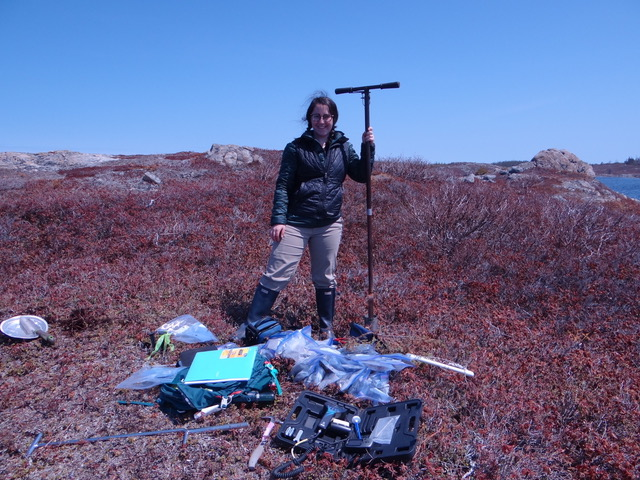Part of an ongoing series of Gazette stories celebrating researchers who received support as part of a major investment by the federal government in science and research on May 29.
Climate change and biodiversity loss are two of the most pressing issues of our time, yet historically they have been addressed separately.
Dr. Kristy Ferraro, one of the newest recipients of the prestigious Banting Post-doctoral Fellowship, joined Memorial University's Faculty of Science in the Department of Biology, Faculty of Science to bridge the gap.
Her project, Conserving Large Mammals to Mitigate Climate Change, will integrate field ecology and philosophy to address the global challenges.
Her research will aim to answer the questions surrounding how the conservation and (re)introduction of animals is an effective tool to combat climate change, and how to ethically implement such efforts.
"I'm interested in uncovering all the ways animals matter, from their roles in ecosystem function to the ways in which they are inherently valuable," said Dr. Ferraro.
Large mammals and carbon cycling
With the help of Drs. Shawn Leroux and Eric Vander Wal, Department of Biology, Dr. Ferraro will study the impact of moose and caribou in the boreal forests of Newfoundland and the effect they have on carbon cycling and storage.
Large herbivores, like the moose and caribou, affect an environment's carbon dynamics through nutrient release, such as urine, feces and body material, as well as their broader ecosystem interactions.
Dr. Ferraro will complete two years of fieldwork on Fogo Island, developing models and conducting empirical data collection to predict where and how the animals can enhance carbon storage, considering the carbon dynamics.
This interdisciplinary work will also create a philosophical framework for ethical conservation.
"As we rely more and more on animals to contribute to functional ecosystems, I'm eager to not only understand how animals might contribute to natural climate change solutions but also how we can ethically justify and implement the use of animals to solve a climate issue of our making," she said.
Lifelong love for animals and philosophy
Dr. Ferraro's passion for the natural world was nurtured in the forests of New Hampshire, where childhood outings with her father often centred on spotting the elusive moose.
"Growing up with deer and moose, it was always special to see them," she said.
This love for wildlife, and her academic interest in philosophy, is why she decided on her unique research focus.

Dr. Kristy Ferraro doing some field work. Photo: Submitted
"The COVID-19 pandemic gave me the time to reflect on how to connect my two passions: environmental ethics and conservation work."
Her academic journey included studies in Brazil, where she admired the ecosystems but realized her heart was in the northern hemisphere.
Transformative research community
Dr. Ferraro highlights the importance of collaboration, particularly with her new colleagues at Memorial University, including Drs. Leroux and VanDerWal.
"They are renowned in their field and brilliant scientists kind and thoughtful advisors. Working with them is a dream," she said.
"I'm delighted to join the Memorial community. I've had the privilege of working adjacent to Memorial for several years, and I am thrilled to officially be part of the transformative work occurring in the Biology department."
Ethical and effective conservation
Receiving the Banting fellowship was a defining milestone for Dr. Ferraro, allowing her to pursue independent research at the intersection of science and philosophy.
"The Banting offers me the unique opportunity to do independent work at the nexus of the climate crisis and the biodiversity crisis while working with scholars at the forefront of their field."
The research will blend empirical data with ethical insights to ensure conservation efforts are both effective and responsible.
"For others to see the transformative vision that I see is so inspiring and confidence-building," Dr. Ferraro said.
Her work promises to inspire a new understanding of how animals contribute to climate solutions and how humanity can ethically honour its role in addressing these challenges.
Funded by the Natural Sciences and Engineering Research Council, the Banting Post-doctoral Fellowship is renowned worldwide for developing the leadership potential of notable new researchers.
The fellowships are valued at $70,000 per year for two years.
The most recent round of Banting Post-Doctoral Fellowships and Vanier Canada Graduate Scholarships was announced on June 14.
Dr. Ferraro will also receive a Banting Post-doctoral Research Grant, valued at a total of $30,000 over two years, to be jointly funded by Memorial's Office of the Vice-president (Research) and the School of Graduate Studies.










